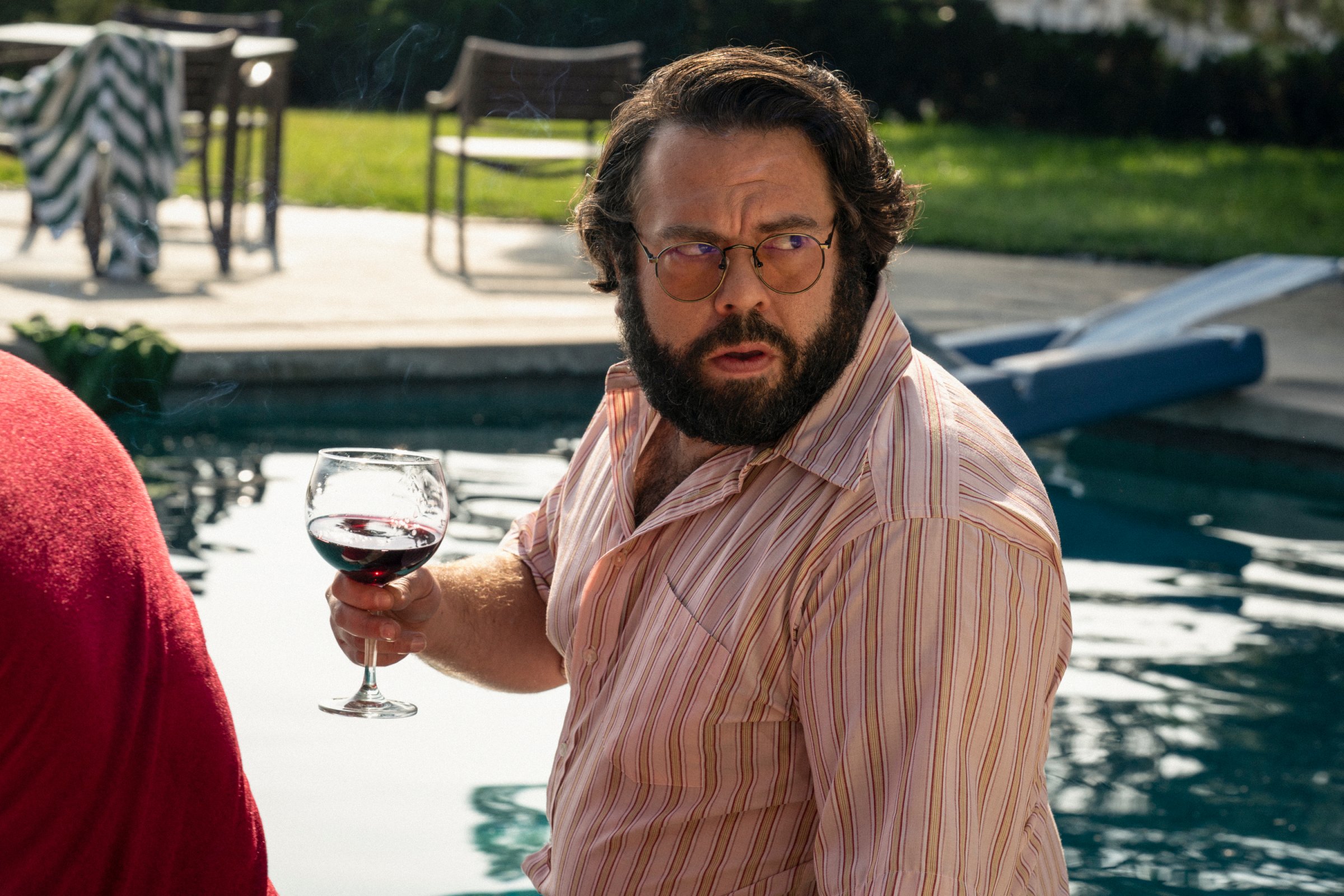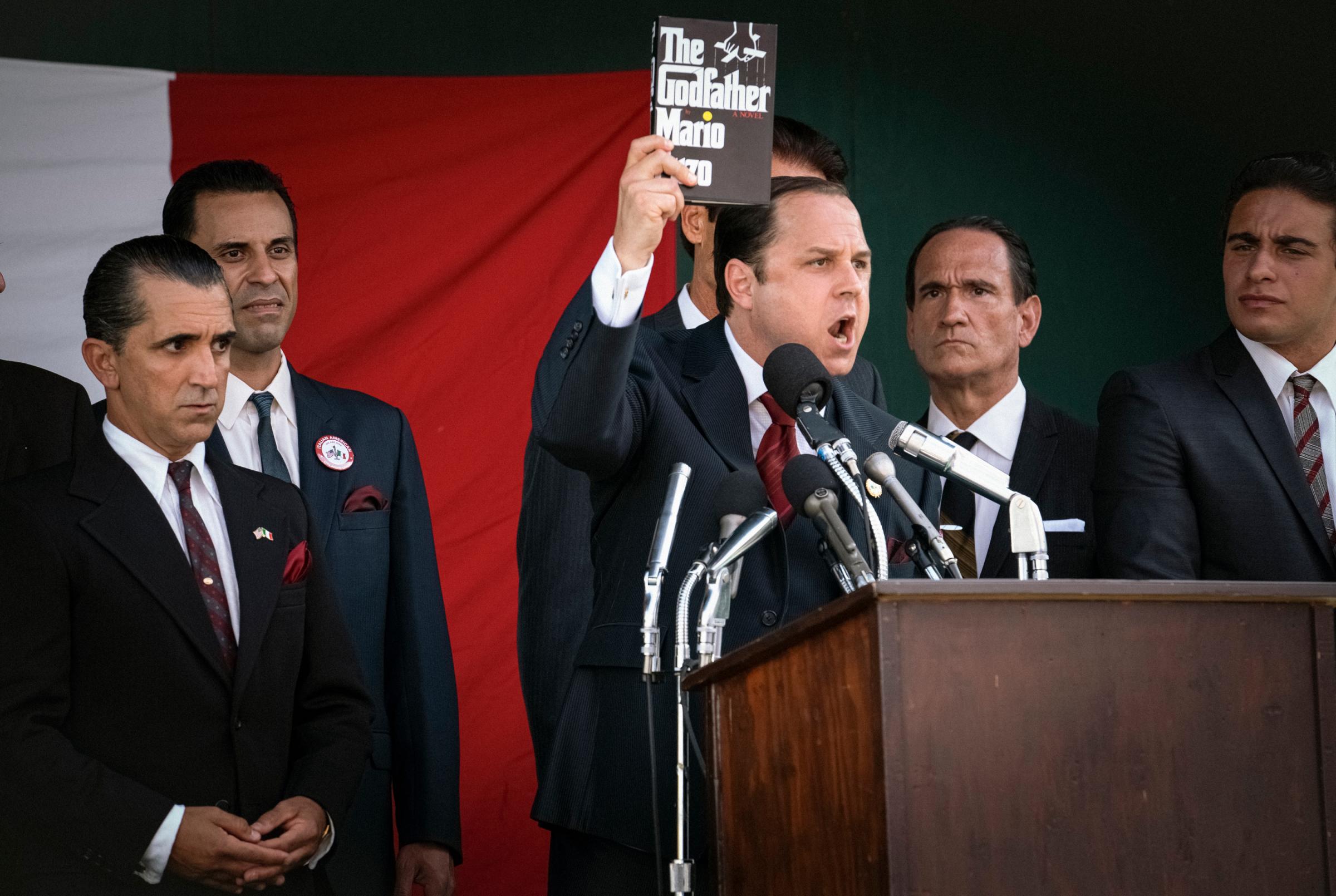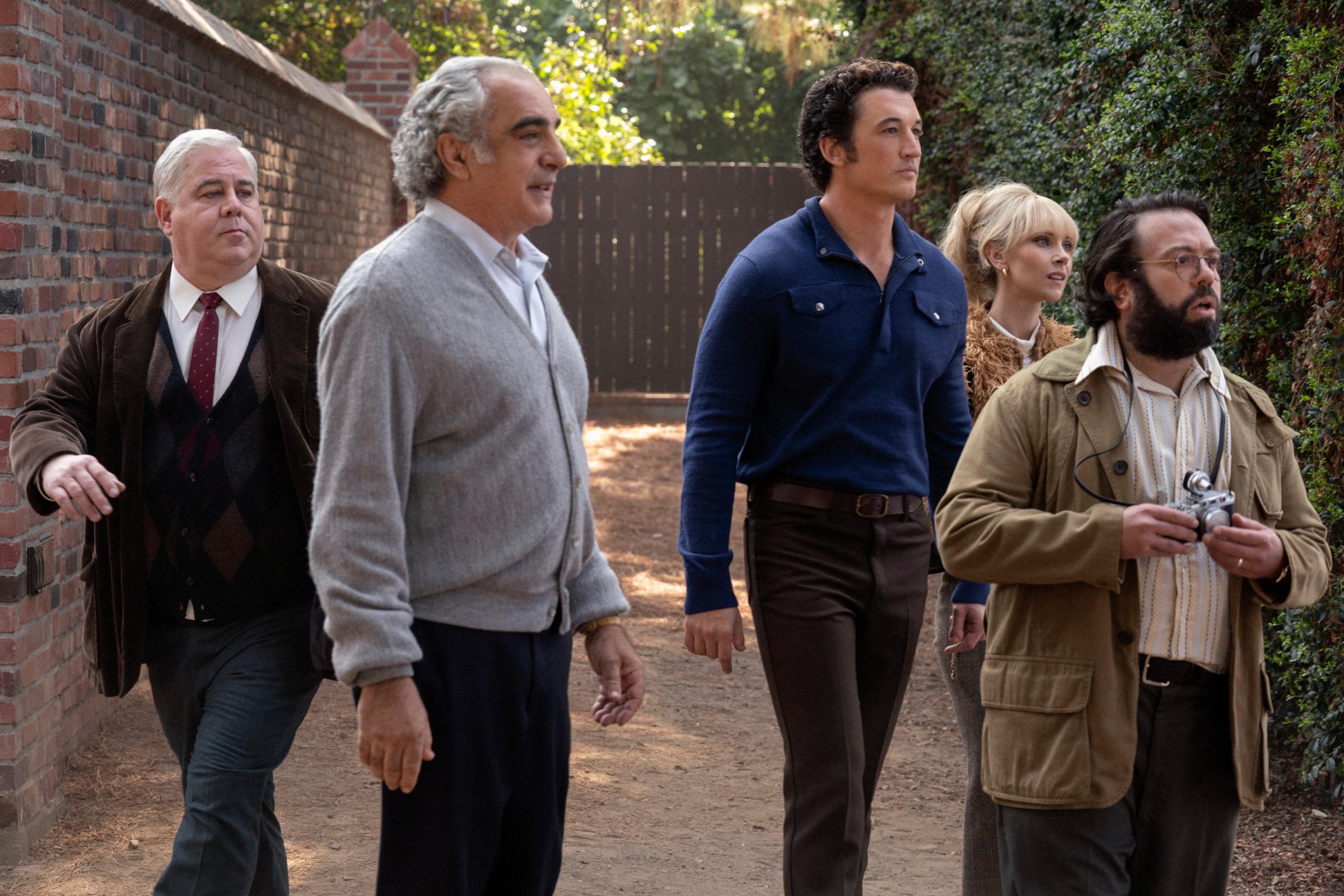
Dan Fogler has been preparing to play Francis Ford Coppola for most of his life and he didn’t even realize it. Fogler stars as the legendary director in the new Paramount+ limited series The Offer, premiering April 28, which tells the chaotic true story behind the making of Coppola’s 1972 masterpiece The Godfather. Fogler first saw the movie when he was a freshman in high school. “I went to Blockbuster and I got myself Parts I and II and I watched them straight,” he tells TIME. “I was like, ‘My god, all of my favorite actors are in this.’” He became so enamored with Coppola that he watched his entire filmography, including the 1991 documentary Hearts of Darkness: A Filmmaker’s Apocalypse, which offered a hellish behind-the-scenes look at how Apocalypse Now got made. “Watching [Coppola] in that documentary was such a huge master class in learning to play this character,” he says. “You really see him as the ringleader in the middle of this circus.”
Fogler brought a bit of that P.T. Barnum energy to The Offer, a series inspired by Godfather producer Albert S. Ruddy’s recollections of making the iconic film, which included numerous near-firings, bitter casting disagreements, and run-ins with the mob. (It should be noted that not everyone agrees with Ruddy’s version of events.) Fogler wanted to offer a “glimpse into Francis’ soul” through his performance in the 10-episode docudrama. “In his heart, Francis is still in a black box theater somewhere trying to pull a performance out of a wacky actor,” Fogler said when describing who Coppola, then a Hollywood newcomer, was at the time of shooting The Godfather. “Francis also reminds me of my dad and kind of talks like him. That connection helped me humanize this guy who is such an icon.”
Fogler didn’t get a chance to speak with the 83-year-old Coppola before taking the role. But, after making The Offer, he has a new appreciation for the 50-year-old film and its director—and he believes others will, too, especially once they realize one of the most iconic films of all time didn’t get made.
Below, learn more about the true story behind The Offer.
Did the mob protest against the making of The Godfather?
In The Offer, the mafia is insulted by the portrayal of Italian Americans in Mario Puzo’s novel. In 1970, mob boss Joe Colombo (Giovanni Ribisi) founded the Italian-American Anti-Defamation League (later known as the Italian-American Civil Rights League) to protest against the book and later the movie. The real Colombo, who was the head of one of the “Five Families” in New York City, did protest against the denigration of Italian Americans. With help from the League’s supporters, he convinced the F.B.I. to stop using the terms “Mafia” and “Cosa Nostra” in press releases. Those words were also why Colombo set his sights on shutting down The Godfather, which was originally called The Mafia. He reportedly had people follow the film’s producer Al Ruddy (played by Miles Teller in The Offer) around and leave threatening notes, as well make harassing phone calls to Paramount Pictures head Robert Evans (Matthew Goode).
Ruddy ended up meeting with Colombo in 1971 and agreed to delete the words “Mafia” and “Cosa Nostra” from the film. He also promised the League that they would have a chance to review the script and “change anything it felt was damaging to the Italian-American image,” according to the New York Times. Lastly, Ruddy agreed to turn over the proceeds of the film’s New York premiere to the League’s hospital fund. In return, Colombo became an ally to Ruddy, smoothing out tensions between the film and the Italian American community of New York, as well as the Teamsters who worked on the production of the film and took their marching orders from the mob. (Ruddy and Colombo’s burgeoning friendship led to Ruddy briefly losing his job.) It was later revealed that members of the League and the mob were cast as extras to make Colombo happy.

Did Frank Sinatra almost beat up Mario Puzo over The Godfather?
There’s a moment in the first episode of The Offer in which Mario Puzo (Patrick Gallo) spots Frank Sinatra (Frank John Hughes) at a Hollywood restaurant and decides to tell him how much he means to him. Unfortunately, Frank quickly realizes this fanboy is none other than the author of The Godfather and things escalate quickly. In real life, Sinatra reportedly believed that the book’s drunken, philandering lounge singer Johnny Fontaine was based on him. Puzo long denied that Fontaine was anything but a fictional character, but the portrayal rubbed Ol’ Blue Eyes the wrong way. In a 2009 Vanity Fair feature, Al Ruddy recalled Sinatra threatening Puzo one night in 1970 at the well-known L.A. eatery Chasen’s. (Fun fact: this anecdote is actually what inspired The Offer creator Michael Tolkin to make the series.)
Ruddy claimed that Sinatra was suing the movie and encouraged Puzo not to go over and chat with the singer. But someone steered Puzo over to Sinatra’s table where the crooner, according to Ruddy, started screaming at the author, “I ought to break your legs” and “Did the F.B.I. help you with your book?” In Puzo’s 1972 essay “The Making of The Godfather,” he alleged that Sinatra called him a pimp and threatened “to beat the hell out of me.” But what upset Puzo most was “a Northern Italian, threatening me, a Southern Italian, with physical violence,” he wrote, calling it “roughly equivalent to Einstein pulling a knife on Al Capone.”
Surprisingly, Sinatra didn’t seem to have any beef with Coppola, who told USA Today back in March, that he ran into the legendary singer before shooting on The Godfather began. “He sort of jokingly said, ‘Why don’t we buy this [movie] from Paramount and I’ll play the godfather,'” Coppola said. “That’s what I recall.”
Did Robert Evans not want to hire Al Pacino for The Godfather because of his height?
Throughout The Offer, Paramount Studio head Robert Evans argues that Francis Ford Coppola can’t cast Al Pacino (Anthony Ippolito) as the lead in The Godfather because he’s too short. Evans really did think that Pacino’s height was a problem. “A runt will not play Michael,” Evans reportedly told Coppola, according to Vanity Fair. But Pacino has no hard feelings towards the late legendary producer. “That’s sorta true,” he said during The Godfather reunion at the 2017 Tribeca Film Festival.
However, Coppola told Deadline in 2020 that the real reason the studio didn’t think Pacino was right for the role of Michael was not his height, but his overall look. “Well, they first wanted Ryan O’Neal. And then [Robert] Redford. I said, ‘The guy ought to really look Sicilian.’ They said, ‘Sicilians are blonde and blue-eyed because they were occupied by the French for many years. So there could be a blonde, blue-eyed Sicilian,’” Coppola explained. Still, he fought for Pacino in the role because “when I read the book I just pictured him,” the director said. “When you do that it’s very hard to get that out of your mind. That’s why I was so persistent.”

Did Mario Puzo send Marlon Brando a letter asking him to star in The Godfather?
In The Offer, Mario Puzo sends Marlon Brando (played by Grey’s Anatomy’s Justin Chambers) a letter asking him if he’d be interested in playing Don Corleone. Mario assumes it’s a longshot that Marlon will even get the note, but it ends up being the key to landing the iconic actor for the part. Puzo really did send Brando a letter in 1970. “I wrote a book called The Godfather,” Puzo wrote. “I think you’re the only actor who can play the part with that quiet force and irony (the book is an ironical comment on American society) the part requires.” That letter was sold, along with other Brando paraphernalia, at Christie’s in 2005.
Brando was intrigued by the note, but the studio was concerned that the 47-year-old actor, then considered washed-up, was a financial risk. The studio would only hire Brando under the condition that he work for no money up front and put up a bond for any budget problems he caused. They also made Coppola shoot a secret screen test with Brando. In 2020, Coppola described the experience of going to Brando’s house and watching him create Vito Corleone on a whim to Deadline: “He rolls up his hair, takes some shoe polish and makes his [blonde] hair dark. He says, ‘The character gets shot in the throat so maybe he talks like this’… He puts some Kleenex in his mouth. He did it all himself and then he took the little cheese and he nibbled it. I’m sitting there, astonished, and then the phone rings. He picks up the phone and he starts talking like the character. I’m like, ‘What the hell? Who was that? What did they think?’” Brando’s performance earned him his second Academy Award, which ended up being one of the most memorable Oscar speeches of all time.
Did Francis Ford Coppola almost get fired from The Godfather?
Francis Ford Coppola always seems like he’s on the brink of losing his mind or his job in The Offer. The reality of the situation wasn’t all that different. “I was seriously on the verge of getting fired maybe on three or four occasions,” Coppola told Deadline in 2020. “Had I not won the Oscar for Patton [in 1970], I would absolutely have been fired from The Godfather.” He claimed that he was often at odds with Paramount over casting and shooting on location in New York. “They wanted to make it in St. Louis,” he said. “And set it in the ’70s.”
While Coppola was able to keep his job, he told NPR in 2021 that making The Godfather was “just the most frightening and depressing experience I think I’ve ever had.” Pacino told the New York Times in March that he once saw Coppola “profusely crying” on set. “And I went up to him and I said, ‘Francis, what’s wrong? What happened?’ He says, ‘They won’t give me another shot.’ Meaning, they wouldn’t allow him to film another setup,” Pacino said. “And I thought: OK. I guess I’m in a good film here. Because he had this kind of passion and there it is.”
More Must-Reads from TIME
- Cybersecurity Experts Are Sounding the Alarm on DOGE
- Meet the 2025 Women of the Year
- The Harsh Truth About Disability Inclusion
- Why Do More Young Adults Have Cancer?
- Colman Domingo Leads With Radical Love
- How to Get Better at Doing Things Alone
- Michelle Zauner Stares Down the Darkness
Contact us at letters@time.com